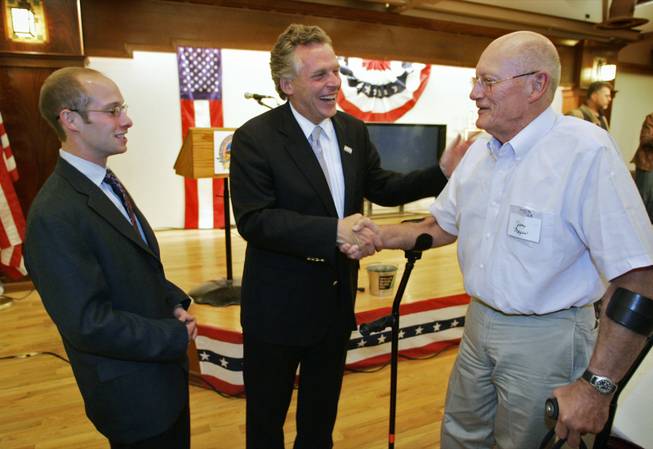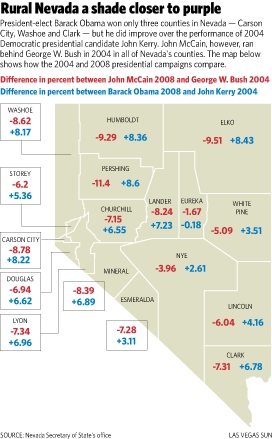
Steve Marcus / FILE
Terry McAuliffe, center, chairman of the Hillary Clinton for President Committee, greets Jerry Meyer, an Ely city councilman, during a Democratic fundraising dinner last year in Elko. Ben Kobren, deputy communications director for Clinton’s Nevada campaign, is at left.
Monday, Nov. 10, 2008 | 2 a.m.
Sun Topics
Barack Obama’s campaign in Nevada put unprecedented effort into courting rural voters.
He visited the northeastern town of Elko — home to rural Nevada’s only commercial-size airport — three times. He was the first Democratic presidential candidate in ages to open an office there during a general election. His campaign stationed five staffers in the rurals, and signed up hundreds of volunteers.
The region, dotted with mining and ranching towns, has typically been the place Democrats have feared (and often failed) to tread. Mistrust of government runs deep. Many say Democratic leadership threatens their way of life — guns, mining, ranching.
Yet after a series of embarrassing defeats, state and national party officials vowed to focus resources on connecting with rural voters.
Obama carried that mantle.
At the same time, Republicans begged Sen. John McCain’s campaign not to take the rural vote for granted. They reminded anyone who would listen that George Bush wouldn’t have carried Nevada without a crushing defeat of Democrat John Kerry there. Democrat Dina Titus would be governor if it weren’t for the rurals, they said.
Elko was Republican vice presidential nominee Sarah Palin’s final campaign stop a week ago tonight.
On Tuesday, Obama picked up 10,175 more votes among rural voters than Kerry, who largely ignored rural Nevada four years ago. Sen. John McCain won 1,901 fewer votes than President Bush. So while McCain won the rurals 60.2 percent to 37.2 percent, Obama narrowed the gap between the parties’ presidential candidates by nearly 14 percentage points.
Yet even if Obama had not gotten a single vote in the 14 counties outside Clark, Washoe and Carson City, and even if all of his votes had gone to McCain instead, he still would have carried the state. Democratic gains in Nevada’s urban areas overwhelmed the rural vote. Nearly 9,000 more ballots were cast in rural counties than in the previous presidential election, but the rural vote dropped nearly one point as a percentage of the state’s electorate.
Those figures raise questions that future candidates running statewide will confront: Has Nevada’s rural vote lost its influence? Should political campaigns write off this huge swath of the state?
Some rural Republicans worry their influence is diminishing. The overwhelming Obama victory in urban Nevada might have shifted state dynamics, they say.
“We used to really be able to leverage things in rural Nevada — just the sheer numbers there,” said Reece Keener, chairman of the Elko Republican Party. “I said in 2004, this may very well be the last statewide election where rurals can leverage the vote, just because of the meteoric rise of Las Vegas and the inroads Democrats are making in the unions.
“We’ll still see Republicans campaigning here because we’ll continue to be an important source of votes. But we just don’t have the pull that we once did.”
Nancy Ernaut, an Elko resident and vice-chairwoman of the state Republican party, said the region will continue to have a significant political influence.
“We may not always get it won, but we have been in the past for getting it over the top,” she said. “There will always be a focus in rural Nevada. This is a whole different type of voter here. This is not a cookie-cutter state.”
Some experts agree. Future turnout in urban areas might not overwhelmingly favor Democrats as it did this year, they say.
“Sure, Obama would have won anyway,” said University of Nevada, Reno, professor of political science Erik Herzik. “But in 2010 will the George Bush-factor be around? Will the Obama charisma factor be around? Will all these new voters be around?
“If you’re answering no to any of those questions, you’re going to need every vote you can get.”
Democrats assert they achieved their objective in rural Nevada, narrowing the gap between Republicans and Democrats.
“It was a huge victory,” said Lance Whitney, chairman of Elko’s Democratic party.
Some Democrats are convinced the rurals can incrementally become bluer, which could pay off in close elections. The registration gap between Republicans and Democrats is narrower than the final presidential vote tally. That was true in 2004 as well.
“We have work to do,” said Elko City Councilman John Patrick Rice, the only elected Democrat in Elko County.
Some Democrats say their hard-won success in rural Nevada will be bolstered by how the party governs.
“When people see we are not radicals who shut down mines and take away their guns and we go out and fix the economy, things switch,” Whitney said. “People’s minds switch.”
Yet some Republicans argue the opposite will be true.
“When we start to see some of the new programs coming out of Washington, it’s going to really galvanize things for us,” Keener said.


Join the Discussion:
Check this out for a full explanation of our conversion to the LiveFyre commenting system and instructions on how to sign up for an account.
Full comments policy